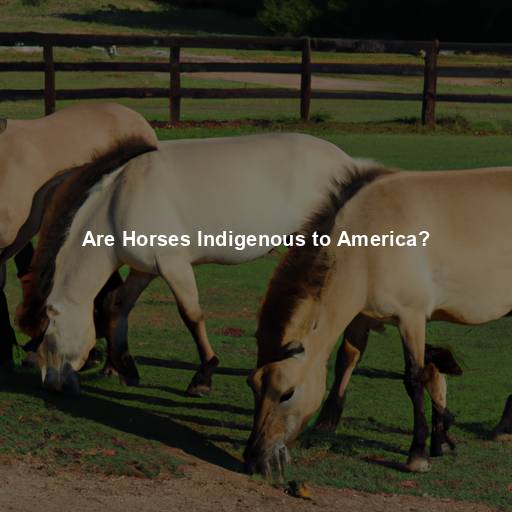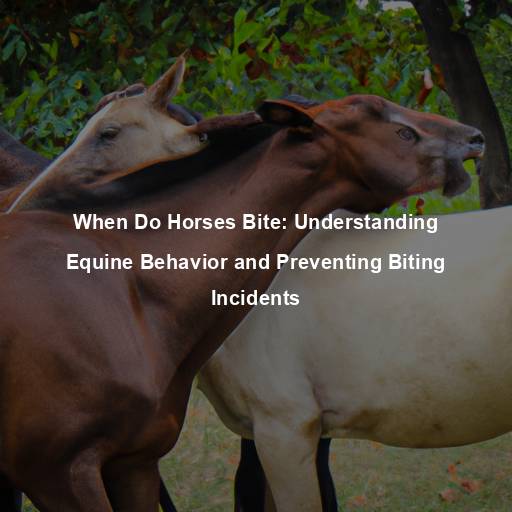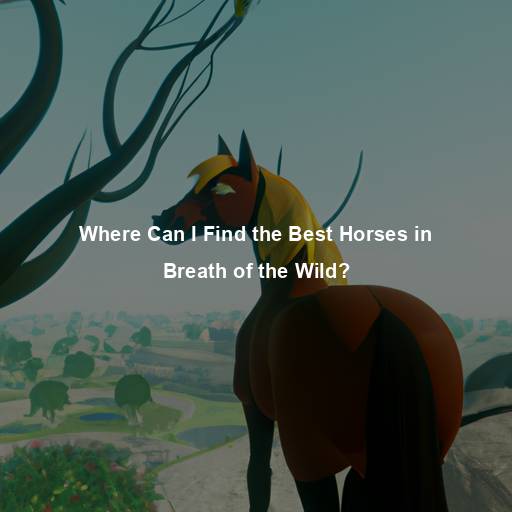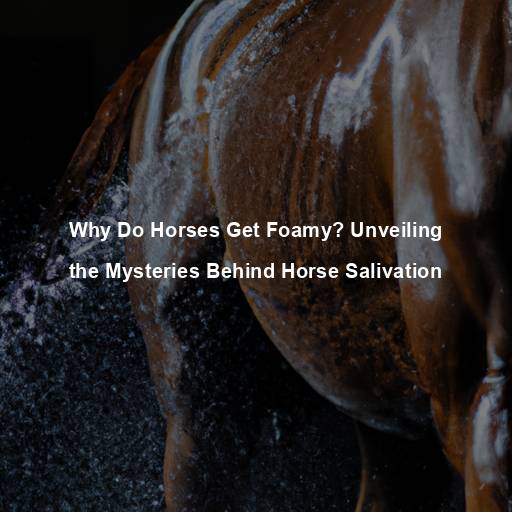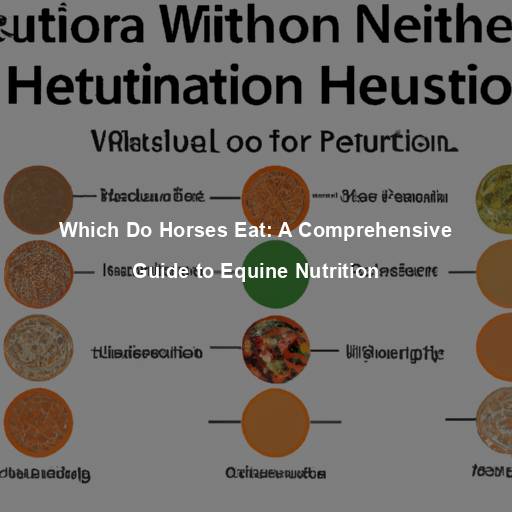Are Horses Indigenous to America?
Last Updated on November 1, 2023 by Evan
Contents [hide]
- 1 The Origins of Horses
- 2 The Spread of Horses
- 3 Spanish Conquistadors and the Reintroduction of Horses
- 4 The Controversy Surrounding Indigenous Status
- 5 The Cultural Significance of Horses
- 6 The Legacy of Horses in America
- 7 In Search of Answers
- 8 The Role of Humans in Horse Migration
- 9 Indigenous Perspectives and Cultural Heritage
- 10 The Complexity of Indigeneity
- 11 Conservation and Preservation Efforts
- 12 A Complex Narrative
- 13 In the Hoofprints of History
- 14 FAQs – Are Horses Indigenous to America?
- 14.1 What is the origin of horses in America?
- 14.2 When were horses reintroduced to America?
- 14.3 Were there any horse-like animals in America before European colonization?
- 14.4 Are there any wild horse populations in America today?
- 14.5 Are there any horse breeds that originated in America?
- 14.6 Do Native American cultures have a historical connection with horses?
- 14.7 Are there any efforts to protect and conserve wild horses in America?
- 14.8 Can horses be considered a symbol of American culture?
The Origins of Horses
A Journey through Time
For many, the mention of horses immediately transports us to the mesmerizing landscapes of the American West, where they have become an iconic symbol of rugged cowboys, rich Native American heritage, and limitless prairies. Yet, the story behind their presence in America is steeped in enigmatic allure and fascinating intricacies. Exploring the origins of these majestic creatures demands a journey through the intricate tapestry of time itself.
The Evolutionary History
Delve into the rich tapestry of equine evolution, where time stretches back into the depths of antiquity. Journey with us to an era shrouded in enigmatic whispers, over 55 million years ago, where a diminutive creature known as Eohippus, or “dawn horse,” graced the ancient lands. In a fascinating twist, these petite equine ancestors boasted not the familiar hoofed elegance we know today, but rather a captivating arrangement of four toes on their front feet and a whimsical three toes adorning their hind feet. Are you ready to uncover the mysteries of our equine heritage?
Throughout the ages, the enigmatic journey of the equine creatures captivated the ever-curious minds of naturalists and enthusiasts alike. As the sands of time gradually sifted, these majestic beings gracefully molded themselves, like masterpieces embodying perpetual metamorphosis, to fit the kaleidoscope of environments that this vast planet had to offer. A remarkable transformation ensued, delicately sculpting their appendages, as a multiplicity of toes elegantly melted into one, ultimately blossoming into the iconic hoof we now hold dear. This intricate dance of adaptation enabled these extraordinary beings to transcend their terrestrial bounds and become the epitome of nimble fleetness, triumphantly thriving in the diverse tapestry of habitats scattered across every corner of the globe.
The Spread of Horses
Across Continents
The majestic journey of horses traversing the globe is an awe-inspiring tale of evolution and migration. Fascinating fossil records unveil North America as the enchanting birthplace of these noble creatures, who later embarked on an extraordinary expedition to conquer distant lands. Astonishingly, their once thriving homeland witnessed their mysterious disappearance approximately 11,000 years ago, leaving us to ponder the enigmatic forces that led to their extinction.
The Extinction Event
The disappearance of horses in North America is a tantalizing puzzle that has captivated scientists for decades. It is widely speculated that the enigmatic connection between the arrival of our ancestors in the region and the sudden decline of these majestic creatures holds the key to unraveling this complex riddle. As ancient humans embarked on their epic odyssey across the Bering land bridge, little did they realize that they were inadvertently introducing a formidable predator into an ecosystem already grappling with the ever-changing whims of Mother Nature. While climatic shifts undoubtedly played their part in this bewildering saga, it is the intertwined narrative of human hunting pressure and ecological intricacies that paints a vivid portrait of disruption and decline, ultimately extinguishing the once-thriving horse populations on the continent.
The Return of Horses
As horses gracefully vanished from the landscapes of North America, their hooves echoed with resilience in distant lands. The enigmatic ebb and flow of history breathed life back into their existence in the Americas, tracing back to the epoch of the 15th century, as the Spanish conquistadors unveiled a mesmerizing equine renaissance. An intriguing tale unfolds, unveiling the perplexing dance between continents and creatures that shaped the course of civilizations.
Spanish Conquistadors and the Reintroduction of Horses
A Transformative Encounter
The advent of Spanish conquistadors in the 15th century set in motion a momentous era in the history of the Americas, leaving an indelible mark on the course of events. Beyond their formidable armament and infectious maladies, the Spaniards introduced an unexpected game-changer: horses. This unforeseen inclusion sparked a profound shift, reshaping not only the physical terrain but also the existence of the native inhabitants, plunging them into a vortex of bewildering changes.
Impact on Native American Cultures
The arrival of horses sent shockwaves through Native American societies, reshaping them in ways both exhilarating and enigmatic. In the blink of an eye, tribes like the Comanche and Lakota Sioux were plunged into a bewildering new era, where these majestic creatures became the catalyst for a metamorphosis of epic proportions. As if touched by a magical wand, the tribes effortlessly embraced the equestrian lifestyle, forging an intricate bond with their four-legged companions that would redefine their hunting rituals, revolutionize their means of travel, and even rewrite the rules of warfare. From the depths of perplexity arose a new chapter in Native American history, where the enigmatic allure of horses became an exhilarating force that coursed through the very veins of their existence.
The Mustangs
As horses escaped or were released into the wild, they formed feral herds known as mustangs. These iconic symbols of the American West continue to roam the plains to this day. The mustangs represent a connection to the past, a reminder of the intertwined history between horses and the indigenous peoples of America.
The Controversy Surrounding Indigenous Status
Defining “Indigenous”
The question of horses’ indigeneity to America has sparked a curious debate fueled by the elusive nature of the term “indigenous”. This notion, intricately entwined with the notion of original inhabitants, gives rise to perplexing inquiries. Although horses indeed trace their roots back to North America, their presence on the continent predates human arrival by a staggering timeframe, leaving us to ponder their true status as indigenous beings.
The Role of Human Influence
Critics argue that true indigeneity requires an unbroken lineage of a species in a particular area. From this perspective, horses cannot be considered indigenous to America because their lineage was interrupted by extinction. However, proponents of the indigenous status argue that the historical presence and cultural significance of horses in the Americas make them indigenous in a cultural sense.
The Cultural Impact
Regardless of the scientific debate, horses undeniably hold a significant place in the cultural heritage of the Americas. They have become deeply intertwined with the identity, mythology, and history of the indigenous peoples and settlers alike.
An Altered Landscape
The reintroduction of horses to the Americas had far-reaching ecological consequences. As horses multiplied and spread across the continent, they transformed the landscape. Their grazing habits and trampling behaviors altered vegetation patterns, creating a mosaic of grasslands and open spaces that were conducive to their survival.
The Role of Horses in Ecosystems
When it comes to the intricate tapestry of nature, horses reign supreme as the ultimate architects of equilibrium. With an enigmatic blend of grace and power, these majestic creatures embody the essence of a keystone species. Their enigmatic grazing rituals serve as a mystical force that safeguards the sanctity of grasslands, averting the encroachment of tenacious woody intruders while nurturing a blossoming symphony of herbaceous life. In this intricate dance, a hidden world comes alive, teeming with a vibrant menagerie of delicate insects, melodious birds, and playful small mammals, all united under the benevolent hoofprints of the mighty equine.
Balancing Act
While horses can undoubtedly bring a sense of majestic charm to certain landscapes, it is important to acknowledge the less glamorous side of their presence. The exuberant grazing habits of these magnificent creatures can sometimes result in a worrisome depletion of vegetation, leading to consequential consequences such as soil erosion and diminished habitat quality for various other species. Furthermore, in some instances, horses have been known to outshine their native herbivorous counterparts in resource acquisition, thereby unsettling the intricate harmony within the delicate ecosystem. Such multifaceted dynamics truly challenge our understanding of the complex relationship between horses and their impact on the environment.
The Cultural Significance of Horses
Sacred Animals
For centuries upon centuries, horses have woven themselves into the tapestry of indigenous cultures, their formidable presence igniting a profound reverence. These majestic creatures symbolize more than mere strength and grace – they embody power, liberation, and a deep connection to the ethereal. From age-old rituals to captivating legends passed down through generations, horses have walked alongside humanity as both companions and celestial beacons.
Art and Symbolism
Throughout the rich tapestry of indigenous art, horses have undeniably emerged as a resounding presence, transcending mere canvases, carvings, and pottery. These sublime representations ingeniously encapsulate the very essence of the equine spirit, imbued with intricate designs and profound symbolism. Unveiling a profound bond enraptured in reverence, indigenous cultures eloquently speak through their art, celebrating the majestic creatures that have enchanted their souls.
Horse Cultures
Certain indigenous tribes, such as the Nez Perce and the Crow, developed distinct horse cultures that revolved around horsemanship and equestrian skills. These cultures celebrated the bond between humans and horses, emphasizing mutual respect and partnership. Horses became integral to daily life, providing transportation, hunting assistance, and a source of pride and identity.
The Legacy of Horses in America
Modern-Day Horse Breeds
In the vast expanse of America, a tapestry of equine wonders unravels, with each breed boasting its own enigmatic allure and inscrutable purpose. Enter the realm of the Quarter Horse, a resolute and adaptable creature, built for unyielding fortitude and untamed versatility. On the other end of the spectrum, we find ourselves awestruck by the regal presence of the Arabian, an embodiment of ethereal elegance and indomitable spirit. These majestic beings seamlessly tread the path of companionship, sporting prowess, and symbiotic partnership, as they gallop across the realms of racing, show jumping, therapeutic endeavors, and tranquil trail conquests, bewitching the souls of humans at every turn.
Conservation Efforts
The future of wild horse populations has become an enigmatic puzzle, weaving together concern and controversy. Within this intricate web, various organizations and governmental bodies passionately engage in the battle to safeguard these majestic creatures. Their mission: to nurture the delicate tapestry of genetic diversity and secure the enduring existence of these untamed herds. Yet, in this perplexing narrative, the challenge lies in harmonizing the intrinsic cultural and historical value of wild horses with the potential ecological consequences that accompany their preservation.
The Horse-Human Bond
Beyond their ecological and cultural significance, horses have a profound impact on individual lives. The bond between humans and horses is a unique and transformative relationship. Horses provide companionship, teach valuable life lessons, and offer a sense of freedom and connection with nature. They can be therapeutic partners, helping individuals overcome physical, emotional, and psychological challenges.
In Search of Answers
Continuing Exploration
The enigma surrounding the origins of horses in America exposes a captivating puzzle that defies a straightforward response. Unlocking the truth necessitates an intricate comprehension of the entwined tapestry of evolutionary narratives, cultural implications, and ecological ramifications. This ongoing voyage of discovery sees a confluence of researchers, historians, and indigenous communities delving into the bewildering depths and enigmatic nuances of the horse’s indelible imprint on America’s intricate past and ever-evolving present.
A Multidimensional Perspective
As we seek answers, it is essential to approach the topic with an open mind and a willingness to embrace multiple perspectives. Recognizing the scientific, cultural, and historical dimensions of the horse’s presence in America allows us to appreciate the depth of its impact and the rich tapestry of stories and experiences woven throughout the centuries.
An Enduring Symbol
Whether we consider horses indigenous to America or not, their significance as an enduring symbol of the American West and the deep connection between humans and animals remains. Their presence continues to inspire, captivate, and remind us of the power of nature, the resilience of indigenous cultures, and the timeless bond between humans and their loyal equine companions.
In the vast tapestry of America’s history, horses have left an indelible hoofprint, forever etching their place in the hearts and minds of those who call this land home. ## Exploring the Genetic Evidence
Tracing Ancestry
Unraveling the enigmatic origins of horses has been a riveting voyage of discovery, guided by the intriguing realms of genetic research. A journey that defies conventional wisdom, as scientists delve deep into the labyrinth of ancient DNA, to unlock the celestial secrets of these majestic creatures’ ancestral connection to the American land. Through the intricate tapestry of comparing modern horse populations and scrutinizing the echoes of bygone eras, researchers have unearthed invaluable insights into the intricate lineage and kaleidoscopic genetic diversity of these mesmerizing beings. A transformative exploration that leaves us in awe of the wondrous complexities that lie within the equine tapestry.
North American Ancestry
New research has shed light on the fascinating history of our equine companions – it appears that the ancient roots of horses can be traced back to none other than North America itself. Astonishing fossil records, alongside compelling genetic evidence, suggest that these magnificent creatures embarked on a remarkable journey across continents, making their way to Asia, Europe, and Africa, before vanishing from their native land of North America. The enigma of their extinction in the very place they once called home might leave us pondering the complexities of their captivating past.
Genetic Diversity
Genetic studies have also shown that modern horse breeds exhibit a significant amount of genetic diversity, reflecting their complex history and various influences. This diversity is a testament to the intermingling of different horse populations throughout time and the impact of human-driven selection.
The Role of Humans in Horse Migration
Human-Assisted Migration
While horses may have originated in North America, it was human migration and intervention that played a crucial role in their global dispersal. As early humans migrated across continents, they brought horses along with them, shaping the distribution and evolution of horse populations.
The Bering Land Bridge
The epic journey of horse migration across the formidable Bering land bridge stands as a monumental testament to the indomitable spirit of these majestic creatures. During the ice age, when frozen landscapes dominated, this serendipitous land bridge emerged to bridge the gap between Asia and North America, offering a lifeline for intrepid explorers, both horse and human alike. Along this treacherous path, the horses galloped with a sense of burning determination, carving a remarkable path of history and creating an unbreakable bond between continents. This monumental feat of nature remains a captivating enigma, an awe-inspiring testament to the resilience and adaptability of these enigmatic creatures.
Human Selection and Domestication
Throughout history, the intricate dance of human migration has intertwined with the captivating legacy of horses, leaving a trail of wonder and bewilderment. As our ancestors embarked on their journeys, they harnessed their ingenuity to selectively cultivate the awe-inspiring equines that graced their paths. Like motifs in a tapestry, the diverse breeds emerged from this shared narrative, as if painted by the brushstrokes of evolution itself. From the majestic steppes to the rolling plains, these remarkable creatures silently spoke of the ancient bond between human and horse, leaving us in perpetual awe of their unparalleled beauty and resilience.
Indigenous Perspectives and Cultural Heritage
Native American Stories and Traditions
From the vast expanse of North America, echoes the enchanting tales woven by indigenous peoples, brimming with wisdom and steeped in ancient traditions. These narratives, passed down through generations, enthrall us with their portrayal of the profound bond between horses and the very essence of their cultures. Revered as celestial beings, steadfast guides, and cherished companions, these magnificent creatures hold a sacred place within the intricate tapestry of indigenous communities, imbuing their customs with an ethereal mystique.
Horse Nations
Certain Native American tribes, such as the Lakota Sioux and the Blackfoot Confederacy, are often referred to as “horse nations” due to their historical and cultural reliance on horses. These tribes developed unique equestrian traditions, horsemanship skills, and spiritual practices centered around the horse.
Revitalizing Indigenous Horse Cultures
In a world often mesmerized by modern marvels, there emerges a captivating shift towards the revitalization and preservation of indigenous horse cultures. With a spirit as wild and untamed as the majestic creatures themselves, communities are coming together to breathe life into forgotten traditions. Through horse breeding programs that weave ancient wisdom into the very fabric of heritage, horsemanship workshops that delicately transfer the secrets of the saddle from one generation to another, and cultural events that dance to the rhythm of hoofbeats, the torch is being fiercely upheld, ensuring the mesmerizing tapestry of these rich cultural traditions remains vibrant and unbroken.
The Complexity of Indigeneity
A Multidimensional Concept
The concept of indigeneity is multifaceted and goes beyond strict biological definitions. It encompasses cultural, historical, and spiritual connections to a specific land and the preservation of traditional practices and knowledge. While horses may not fit the strict criteria of being indigenous in a biological sense, their cultural significance cannot be overlooked.
Cultural Indigeneity
From a cultural perspective, horses hold deep meaning and significance to indigenous peoples in America. They have become intertwined with indigenous identity, ceremonies, and daily life. The cultural indigeneity of horses reflects the enduring impact they have had on indigenous cultures and their importance in shaping the history of the Americas.
Conservation and Preservation Efforts
Protecting Wild Horse Populations
The perpetual task of maintaining and managing the untamed horse populations presents an intricate tapestry of dilemmas. Striking a delicate equilibrium between safeguarding these majestic herds while grappling with the consequential ecological disturbances demands thoughtful strategies and harmonious cooperation among governmental bodies, environmental advocates, and indigenous societies.
Promoting Genetic Diversity
Ensuring the continued existence and strength of various horse species is of utmost importance for their future endurance and adaptability. Meticulous endeavors are currently underway to cultivate thriving breeding communities and avert the risks associated with inbreeding, all while keeping a vigilant eye on genetic patterns.
Education and Cultural Appreciation
Promoting education and cultural appreciation surrounding the relationship between horses and indigenous cultures is essential. By raising awareness and fostering understanding, we can foster respect for indigenous perspectives and the importance of preserving cultural heritage.
A Complex Narrative
Embracing Complexity
In the intricate tapestry of America’s heritage, the origins of horses dance amidst shades of ambiguity, defying simplistic categorizations. To truly unravel this enigma, we must delve into the realms of history, genetics, culture, and ecology, navigating an intricate labyrinth of interwoven threads. It is through this embrace of intricate complexity that we can fully fathom and cherish the captivating presence of horses in both the tapestry of America’s bygone eras and its ever-evolving present.
A Story of Resilience and Adaptation
The story of horses in America is one of resilience, adaptation, and the enduring bond between humans and animals. From their origins in North America to their global dispersal and cultural significance, horses have left an indelible mark on the landscapes and cultures they have encountered.
Continuing the Dialogue
As research and understanding of horses’ history and significance evolve, it is essential to continue the dialogue and engage in respectful conversations. By listening to diverse perspectives and embracing the complexity of the topic, we can deepen our appreciation for the intertwined histories of horses and the indigenous peoples of America.
In the Hoofprints of History
A Lasting Legacy
From their undeniable imprint on the Americas, it is clear that horses hold a mystical power that transcends boundaries of time and culture. They embody the essence of freedom, forging an unbreakable bond with humans throughout history. With each step they take, they leave an indelible mark, forever shaping the landscapes and narratives of our collective past. As we journey through the pages of time, we are bewitched by the enchanting hoofprints, unraveling the remarkable tale of these majestic creatures and their profound influence on our world.
A Call to Appreciation
As we traverse the vast landscapes of the American West, it is hard not to be enthralled by the majestic presence of horses. They effortlessly gallop, their hooves beating a rhythmic symphony on the earth, leaving us in awe of their sheer power and grace. These magnificent creatures have woven themselves into the very fabric of American culture, both symbolizing freedom and manifesting a profound connection between humans and nature. By acknowledging the intricate relationship between horses and our nation, we embark on a journey of appreciation, unearthing a profound tapestry of history and emotions that ties us to these enigmatic beings.
FAQs – Are Horses Indigenous to America?
What is the origin of horses in America?
Let’s unravel the enigmatic history of horses in America! Contrary to popular belief, these majestic creatures have a far more intriguing origin story on North American soil. Eons ago, wild horses roamed the untamed plains, evolving from petite, multi-toed ancestors into the harmonious equines we now admire. Yet, an unprecedented twist of fate unfolded over 10,000 years ago, shrouding the reasons behind their puzzling extinction in an enigmatic haze that continues to baffle scientists today.
When were horses reintroduced to America?
The graceful and powerful presence of horses in America dates back to the remarkable voyages of European explorers and settlers in the 15th and 16th centuries. As Christopher Columbus and Hernán Cortés embarked on their audacious encounters, they carried with them the noble companionship of these majestic creatures. With an inexplicable swiftness, horses galloped across the vast lands, profoundly reshaping Native American communities, revolutionizing their modes of transport, and forever altering the very essence of hunting practices. Through this ethereal narrative, the enigmatic impact of these equine pioneers is unveiled, leaving us captivated in a whirlwind of transformation and enigma.
Were there any horse-like animals in America before European colonization?
Before European colonization, there were no horses in America in the strict sense. However, there were other horse-like animals known as “equids,” which closely resembled horses. These equids, such as the three-toed horse (Hippidion) and the American zebra (Hemiauchenia), roamed North America long before the arrival of modern horses. Despite their similarities, these native equids were part of different evolutionary lines from modern horses.
Are there any wild horse populations in America today?
Yes, there are wild horse populations in America today, but they are not considered indigenous. The wild horses commonly found in the western parts of the United States, such as the mustangs, are descendants of domestic horses brought over by the Spanish. Over time, some of these domestic horses escaped or were released, and their population grew to the point where they are now considered wild. These wild horse populations often face management challenges and debates regarding their impact on the environment.
Are there any horse breeds that originated in America?
America, a land of boundless beauty and diversity, has birthed a plethora of magnificent horse breeds that have left an indelible mark on the equestrian world. Among these iconic American breeds are the spirited American Quarter Horse, with its lightning-fast agility and unparalleled versatility, the wild and untamed Mustang, embodying the untamed spirit of the West, the eye-catching and uniquely patterned Appaloosa, and the regal yet gentle Tennessee Walking Horse, renowned for its smooth gait and elegance. These remarkable equine creations are a testament to the tireless efforts of breeders who have carefully honed and refined these breeds through the intricate art of selective breeding. Each breed, with its own distinct set of characteristics, serves as a testament to the diverse roles horses have played in American history – be it working alongside cowboys in cattle ranches, or dazzling audiences in the thrilling arenas of racing and showmanship. These breeds, born from the mystique and wonder of the American landscape, continue to captivate and inspire horse enthusiasts worldwide, leaving one in awe of their magnificence and unwavering presence.
Do Native American cultures have a historical connection with horses?
The majestic arrival of horses in America ignited a whirlwind of transformation within the storied tapestry of Native American cultures. As these magnificent beings stepped onto the native soil, their very presence interwove seamlessly with the fabric of everyday life for countless nations. A symphony of change unfolded as horses mesmerizingly disrupted the norms of transportation, hunting, warfare, and trade. The profound acquisition of these four-legged marvels unfurled an exquisite dance of liberty, birthing elevated mobility, emboldened prowess in the hunt, and the forging of intricate trading networks, connecting diverse tribes across vast distances.
Are there any efforts to protect and conserve wild horses in America?
Across America, a myriad of initiatives and dedicated groups fervently strive to safeguard the mesmerizing yet vulnerable wild horse populations. With a laser focus on maintaining an optimal population size, ensuring their holistic welfare, and discovering ingenious solutions for safeguarding both these majestic creatures and the habitats they grace, these organizations leave no stone unturned. Nonetheless, the path towards achieving harmony within the realm of wild horse management remains strewn with complexities, as differing interests vie for attention and resources become constrained in a vast juggling act.
Can horses be considered a symbol of American culture?
Horses have undoubtedly become an iconic symbol of American culture. Over the centuries, horses have played pivotal roles in shaping American history, from their reintroduction by Europeans to their impact on westward expansion, agriculture, and various sports disciplines. Horses are often associated with freedom, the pioneering spirit, and the American West. They continue to be admired, valued, and celebrated in various aspects of American society, making them an enduring symbol of the nation’s heritage.

